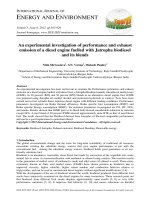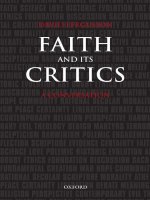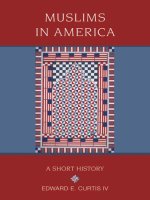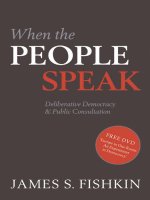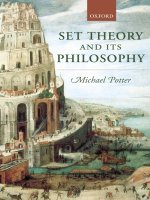- Trang chủ >>
- Khoa Học Tự Nhiên >>
- Vật lý
faith and its critics a conversation oct 2009
Bạn đang xem bản rút gọn của tài liệu. Xem và tải ngay bản đầy đủ của tài liệu tại đây (618.83 KB, 204 trang )
FAITH AND ITS CRITICS
This page intentionally left blank
Faith and Its Critics
A Conversation
David Fergusson
1
3
Great Clarendon Street, Oxford ox2 6dp
Oxford University Press is a department of the University of Oxford.
It furthers the University’s objective of excellence in research, scholarship,
and education by publishing worldwide in
Oxford New York
Auckland Cape Town Dar es Salaam Hong Kong Karachi
Kuala Lumpur Madrid Melbourne Mexico City Nairobi
New Delhi Shanghai Taipei Toronto
With offices in
Argentina Austria Brazil Chile Czech Republic France Greece
Guatemala Hungary Italy Japan Poland Portugal Singapore
South Korea Switzerland Thailand Turkey Ukraine Vietnam
Oxford is a registered trade mark of Oxford University Press
in the UK and in certain other countries
Published in the United States
by Oxford University Press Inc., New York
© David Fergusson 2009
The moral rights of the author have been asserted
Database right Oxford University Press (maker)
First published 2009
All rights reserved. No part of this publication may be reproduced,
stored in a retrieval system, or transmitted, in any form or by any means,
without the prior permission in writing of Oxford University Press,
or as expressly permitted by law, or under terms agreed with the appropriate
reprographics rights organization. Enquiries concerning reproduction
outside the scope of the above should be sent to the Rights Department,
Oxford University Press, at the address above
You must not circulate this book in any other binding or cover
and you must impose the same condition on any acquirer
British Library Cataloguing in Publication Data
Data available
Library of Congress Cataloging in Publication Data
Fergusson, David. Faith and its critics: a conversation / David Fergusson.
p. cm.
Comprises the Gifford lectures delivered in Apr. 2008 at the University of Glasgow.
Includes bibliographical references (p.).
ISBN 978–0–19–956938–0
1. Christianity and atheism. 2. Faith. 3. Apologetics I. Title.
BR128.A8F47 2009
261.2
1—dc22 200901167
Typeset by SPI Publisher Services, Pondicherry, India
Printed in Great Britain
on acid-free paper by
CPI Antony Rowe, Chippenham, Wiltshire
ISBN 978–0–19–956938–0
13579108642
PREFACE
This book comprises the Gifford Lectures delivered at the
University of Glasgow in April 2008. I am grateful to the
Vice-Chancellor, Sir Muir Russell, for his invitation, and also
to the members of the Gifford Committee for their generous
hospitality, in particular Professor David Jasper.
The occasion of these lectures provided a welcome opportu-
nity to return to my home city and the alma mater where I first
studied philosophy more than thirty years ago. I am grateful
for the many friends, family, colleagues, and former teachers
who attended the six lectures and participated so constructively
in discussions each evening, many of them proving thereby
that Glasgow and Edinburgh are not so very far apart.
In preparing and writing up the material, I have had to
draw upon the expertise of colleagues in a wide variety of
fields. For comments, suggestions, and corrections, thanks
are owed (in no particular order) to Robert Segal, Steve
Sutcliffe, Ian Hazlett, David Clough, Lisa Jane Goddard,
Mona Siddiqui, Jeremy Begbie, Gordon Graham, Wilson
Poon, Michael Fuller, Perry Schmidt-Leukel, Neil Spurway,
Sandy Stewart, Alexander Broadie, Graeme Auld, Hans
Barstad, George Newlands, Paul Heelas, Iain Torrance, Larry
Hurtado and Christian Lange. I am especially indebted to
my former colleague Michael Partridge for reading and com-
menting at some length on the typescript of the lectures. Our
conversations enabled me to gain much greater clarity on many
points, though the flaws remain entirely my own. I am grateful
also for the assistance of Sean Adams in the preparation of the
index.
This page intentionally left blank
CONTENTS
Introduction 1
1. Atheism in Historical Perspective 15
2. The Credibility of Religious Belief: Claims
and Counter-Claims 34
3. Darwinism: How Much Does It Explain? 61
4. Morality, Art, and Religion: Invention or
Discovery? 91
5. Is Religion Bad For Our Health? Saints, Martyrs,
and Terrorists 120
6. Sacred Texts: How Should We Read Them? 151
Conclusion 178
Bibliography 182
Index 191
This page intentionally left blank
INTRODUCTION
Th e ‘new atheism’ is a term coined recently to describe a
wave of writings that offer a full-frontal attack on the intellec-
tual claims and moral effects of religion. Associated primarily
with Richard Dawkins, it also characterizes the work of other
intellectuals who share much of his hostility towards religion.
Despite the tendency in some theological circles to dismiss
this literature rather scornfully, I consider it worth engaging
for several reasons. At the very least, it is incumbent upon
theologians of whatever stripe to offer a response to the argu-
ments, criticisms, and dismissal of some of their central claims.
The New Testament, which contains a number of references
to the philosophy of the ancient world, enjoins its readers to
give an account of the hope that is within them.
1
At the same
time, the work of the new atheists is intensely interesting; the
range of questions and subjects raised are of concern to every
person. These can generate a heated discussion in any pub or
senior common room. Every human being ought to have an
understanding, however implicit, of the nature of the world in
which we live, the significance of our lives, and our deepest
convictions. To evade this is simply to miss the significance of
these questions and the commitments that will inevitably be
reflected in the responses we offer.
We live in an age when for many of us there are competing
options and different ways of living. Charles Taylor sees this
2 Introduction
as one of the most significant differences from the world of
pre-modernity. Belief in God is no longer a default position in
our society. It has become an ‘embattled option’ that is taken
amidst doubt, criticism, challenge, and the sometimes easier
alternatives of unbelief.
2
One cannot ignore those beliefs that
are different to one’s own—we need to gain some appreciation
of what these are like and how they look from the inside, as it
were. In doing so, one might have an enhanced sense of one’s
own faith and why it is that one sticks with it. Perhaps the most
important reason for a theological study of atheism is that it
may have something salutary to teach those of us who remain
committed to faith. Of course, this is far removed from the
intention of the new atheists, who advocate the abandonment
of religion rather than its renovation. No quarter is given and
no compromise is sought. Yet the consideration of the most
powerful challenges that can be levelled against religion may
itself enable a clearer and more chastened perception of what it
is one believes and to which one is committed. Jonathan Sacks
has spoken in this context of the ways in which atheists can
save the faithful from believing too much. There are times
and places where silence and scepticism serve us better than
the passionate certainties that may later appear misplaced and
even harmful. At least, this can sometimes happen. The history
of Christian theology reveals that the tradition developed and
was shaped decisively by encounter with opponents and revi-
sionists. Much of what we intuitively believe is the product of
history and patterns of interpretation that have evolved over
many centuries. This process is ongoing. So in what follows
I aim to pursue a more patient and constructive conversation
with the new atheism in the hope that there are possibilities
for occasional alliances and recognition of mutual insights. In
this respect, it will heed Bernard Crick’s plea for a coalition
of humanists and believers who can together find ways of
working for common goals even amidst significant intellectual
disagreement.
Introduction 3
How new is the new atheism? The present movement prob-
ably comes closer to the combative work of Bertrand Russell
than to other modes of sceptical thought, particularly the
more wistful agnosticism that we find in the late Victorian
and Edwardian periods. Hostility to the intellectual claims of
religion, the attack on its pathological effects, and the convic-
tion that people can live better without it are all features of
several recent high-profile studies. But what is now missing is
the elegiac tone. God’s funeral, to use Thomas Hardy’s phrase,
is long since passed. There is no need for mourning. The
text of the new atheism might be Psalm 30:5. ‘Weeping may
linger for the night, but joy comes in the morning.’ There is
indeed a good deal of confidence that atheism can provide a
more wholesome, morally alert, and psychologically liberating
way to live. One recent attempt at a psychological profiling
of atheists concludes that the typical atheist is male, tolerant,
law-abiding, well-educated, and less authoritarian than many
of his contemporaries. Atheists, we are assured, make good
neighbours.
3
To a large extent, we are dealing with an English-language
movement, although we can find other European thinkers
expressing similar sentiments. Today’s leading exponents of
atheism are: Richard Dawkins, an Oxford scientist; Daniel
Dennett, an American philosopher; Sam Harris and Christo-
pher Hitchens, both writers based in the USA (although
Hitchens is English); Anthony Grayling, a London philoso-
pher; and Michel Onfray, a French philosopher. These lead-
ing figures are all men, a fact that has not gone unnoticed.
In her study of the movement, Tina Beattie complains that
we are witnessing today a testosterone-charged fight. ‘There
is something a little comic, if not a little wearisome, about
this perennial stag-fight between men of Big Ideas, with male
theologians rushing to defend the same pitch that they have
fought over for centuries, which is now being colonised by
men of Science, rather than men of God.’
4
On the other
4 Introduction
hand, Beattie herself proves capable of throwing a few good
punches.
Much of the debate has been conducted through the internet
on websites and blogs. This has resulted in a high level of
public participation, although one may wonder whether the
phenomenon of blogging tends to encourage extremist sound
bites as opposed to more patient deliberation. On the fringes
of the movement, there are a significant number of journalists,
novelists, and popular thinkers who act as their cheerleaders.
Consider Muriel Gray’s sycophantic introduction of Richard
Dawkins at the 2007 Edinburgh Book Festival. After introduc-
ing him as one of the world’s top intellectuals, she then declares
that he has not merely started a debate but actually closed it. So
powerful is his case that the argument is effectively over. There
is little more to be said about religion after being confronted
by all this ‘fantastic evidence’.
5
The movement also has the support of leading literary
figures, including Martin Amis and Ian McEwan. It has
been suggested that Henry Perowne, the central character in
McEwan’s acclaimed novel Saturday, resembles an ideal type of
new atheist.
6
He is not passionate about atheism or scornful of
religion, but he is someone who lives well without any sense
whatsoever of the need for faith. A neurosurgeon working in
London, Perowne leads a fulfilled professional and personal
life. Yet he is perplexed by the political events around him
following 9/11 and the war on Iraq. Religion has now become
a menacing force on the horizons of his consciousness. In the
closing phase of the novel, he looks out from the bedroom win-
dow of his London house and contemplates how its original
owner a hundred years earlier would have had little compre-
hension of what awaited the world in the century ahead. So
too, the twenty-first century has suddenly become an enigma
with the gathering of strange and alien forces that have reached
his doorstep.
Introduction 5
A hundred years ago, a middle-aged doctor standing at this window
in his silk dressing gown . . . might have pondered the new century’s
future. February 1903. You might envy this Edwardian gent all he
didn’t yet know. If he had young boys, he could lose them within a
dozen years, at the Somme. And what was their body count, Hitler,
Stalin, Mao? Fifty million, a hundred? If you described the hell that
lay ahead, if you warned him, the good doctor would notbelieve
you. Heretheyareagain,totalitarians in different form, still scat-
tered and weak, but growing, and angry, and thirsty for another mass
killing.
7
This recent wave of writings has emerged in the aftermath
of the events of 9/11. A world in which religious convictions
appear resurgent and dangerous seems different from that
inhabited by secularized intellectuals a generation ago. Then
religion could be allowed to wither on the vine. The secular-
ization of western society led many to believe that, under the
conditions of modernity, religion would gradually disappear
as a socially significant phenomenon. It would be reduced
at most to a private life-style choice that was both quaint
and harmless. Now, however, we are confronted with signif-
icant adjustments to the secularization thesis. Fears have been
expressed about the emergence of a new Islamic Europe—
Eurabia. As a result of patterns of immigration, the capacity of
Muslim populations with their high fertility rates to outbreed
everyone else, and the misguided policy of multiculturalism,
Europe, it is argued, soon will unwittingly have a new religious
identity. This thesis is further encouraged by the siren call of
some American commentators who argue that secular Europe
has lost its moral and spiritual direction and is now ready
to be conquered. These stark claims have all been patiently
refuted and countered by Philip Jenkins in his recent book
God’s Continent, but they persist in the media and are widely
circulated.
8
The dramatic resurgence of religion is even conceded by
a recent issue of the Economist. Having proclaimed the death
6 Introduction
of God at the turn of the millennium, the Economist now
concedes that this was a mistaken diagnosis. Its leader writes,
‘God is definitely not dead, but He now comes in many more
varieties.’
9
In global terms, religion remains a potent socio-
political force. The sociologist Peter Berger in his study of
de-secularization describes our world today as being ‘furi-
ously religious’.
10
Having abandoned his earlier espousal of the
secularization thesis, Berger claims provocatively that what is
required is sociological study of the exceptions, for example
Swedes and New England college professors.
In its classical form, the secularization thesis was indebted
to two of the founding fathers of sociology—Max Weber
and Emile Durkheim. The theory of rationality proposed by
Weber implied the disenchantment of the world and with it
the steady and irreversible decline of religious belief. Having
lost its plausibility structure as a result of the encounter with
modern science, medicine, and politics, religious faith was
no longer sustainable. For Durkheim, the differentiation of
functions in a modern society implied that much of what had
previously been controlled by the churches was now assumed
by professional organizations, secular institutions, and the
political state. Following this loss of influence, it was assumed
that the activities of faith communities would inevitably
decline in terms of their public significance. With this shift
in both belief and action, the secularization of modern society
has been a widely held axiom of scholars for over a century.
Around 73 percent of the world’s population now adheres to
one of the four global religions—this figure represents a sharp
increase from figures earlier in the twentieth century.
11
The
counter-example of the USA, the world’s wealthiest nation, is
perplexing for the classical secularization thesis. This can be
dealt with in either of two ways. It may be that America is an
exception, requiring particular explanation for the salience of
religion there. One might also seek to show that there are some
symptoms of religious decline even there. Alternatively, a case
Introduction 7
can be made to demonstrate that, from a global perspective,
Europe is the exception rather than the rule. The resurgence
of faith in much of the southern hemisphere and in Asia sug-
gests at the very least that the secularization thesis requires
to be significantly qualified. China and India, the world’s two
most populous countries, do not immediately strike one as
travelling on a road to secularization in the slipstream of
economic modernization. At the same time, even the most
rapidly secularized societies of western Europe may be wit-
nessing not so much the decline of religious activity and belief
as its displacement into alternative expressions. Grace Davie’s
thesis about ‘believing without belonging’ suggests that human
lives continue to be enchanted in significant ways along-
side the decline in adherence to traditional institutions. The
current interest in ‘spirituality’ may be symptomatic of this,
although some rigorous questioning is required of much of its
rhetoric.
12
Much of today’s new atheism is frustrated by the sociolog-
ical evidence. Religion is resurgent, thus disconfirming much
of the Durkheimian thesis. At the same time, the Weberian
account of rationality and disenchantment seems intuitively
right. Religious faith still lacks plausibility for many intellec-
tuals, thus rendering secularization the only rational outcome.
Still in the grip of Weberian assumptions, much modern athe-
ism is therefore not merely dismissive of religion but angry
and frustrated by its re-emergence as a powerful social force.
This is particularly evident in two ways. First, the American
context, with the ongoing wars over the teaching of creation
science and intelligent design theory in public schools, remains
at the forefront of contemporary debate. Much of the hostil-
ity heaped on religion is directed at the perceived obscuran-
tism of evangelical Christianity and its particular disbelief in
Darwinian evolution. A second feature of the recent debate
concerns what is called ‘Islamism’, a militant and deviant brand
of Islam that advocates violent opposition to the hegemony of
8 Introduction
western, democratic capitalism. This is sometimes traced to
developments from the 1970s onwards, although it is likely
that a much longer historical explanation is required for the
various dispositions of Islam, particularly in the middle east,
towards western culture. For example, the frustration caused
by the hegemony of the west has precipitated reform move-
ments in Islam since at least the eighteenth century. Fur-
thermore, the colonial era is perceived by many Muslims
to have ideological links with the crusades of the middle
ages.
13
The relationship between theology and sociology is here
quite complex. Neither belief nor unbelief requires to be
closely annexed to a particular reading of the seculariza-
tion thesis. One might readily accept it as an explanation
of the decline in religious belief and activity in the modern
world without assuming that this renders religion untrue or
lacking in value. Truth claims, after all, are not settled by
counting heads or finding out who is in charge. Conversely,
one might recognize that much of the older secularization
theory was just too simplistic to deal adequately with the
phenomena. At the same time, a sceptic might even claim
that human beings are universally disposed to be religious,
whether genetically or otherwise, without thereby committing
to the validity or ineluctability of faith. In this way, mass
adherence to religious practice and belief would be entirely
compatible with a naturalist explanation of its origin and
function.
Indeed a more nuanced relating of theology to sociol-
ogy might offer some prospects that are welcome on both
sides. For example, the recognition that a religiously diverse
society facilitates choice and human responsibility does not
always have to be the possession of secular liberalism. Sev-
eral decent theological arguments were advanced in support
of religious plurality in the early modern period, particularly
after the traumas of the Thirty Years War. Some forms of
Introduction 9
secularism, therefore, can be seen as the upshot of distinc-
tively religious convictions about the character of faith and
religious disagreement.
14
And, second, a degree of disenchant-
ment and differentiation of functions may help to sober some
religious sensibilities and offset the potential for pathological
expressions of faith. This ought to be recognized by expo-
nents of belief. It would be hard to argue that this has not
played a positive factor in the gradual decline of sectarian-
ism in Scotland and Northern Ireland over the past gener-
ation. In the eighteenth century, the moderate philosophers
and theologians in Glasgow and elsewhere recognised that
some heat needed to be taken out of religious controversy
if Scotland were to be pacified and to achieve a greater
measure of cultural, political, and economic flourishing. The
Scottish Enlightenment thus took root in Presbyterian soil,
partly through this recognition and the transformation that it
afforded.
For the new atheism, however, much if not all religion is
treated as pathological. It is destructive of social harmony,
individual responsibility, and patterns of cooperation across
languages, tribes, and nations. The anthem of this movement
might be John Lennon’s Imagine.
Imagine there’s no countries
It isn’t hard to do
Nothing to kill or die for
And no religion too
Imagine all the people
Living life in peace
Within this current debate, there is also the sense amongst
some public intellectuals that religion has been treated as a
no-go area for robust criticism. It is suggested that the politics
of tolerance, the need to integrate immigrant and religiously
diverse groups into our western societies, the attempt to pro-
mote dialogue and better understanding of Islam have all
10 Introduction
contributed to a soft-centred intellectual culture that fails to
engage robustly with religion.
15
Clearly this is a source of irri-
tation if not outrage amongst many critics who have assumed
for years that religion is irrational, pointless, and often highly
destructive. So we are witnessing a fierce counter-attack on the
part of secularism. This may explain the campaigning language
of much of the literature. Dawkins writes for people who want
to question religion and to find the courage to doubt publicly
and openly some of the strongest convictions of their fellow-
citizens. Dennett speaks about the need to ‘break the spell’
and so to end the taboo surrounding critical discussion of
religion. He argues that atheists need to find their identity,
not negatively as those who reject what others believe, but as
those who have a positive and healthy account of the world and
the ends of human life. A new label has even been proposed,
that of ‘brights’. Atheists are to be termed ‘brights’, people
who have the wit and wisdom to reject the discredited habits
and convictions of their ancestors. If believers find this term
patronizing then they are invited to devise their own comeback
label. Why not call yourselves ‘supers’, as in ‘supernaturalists’,
suggests Dennett?
16
So you can be bright or super, it seems,
but not super-bright.
This sense of heroically championing a worthy but
persecuted cause may appear strange to some audiences, par-
ticularly in Europe. After all, it is not particularly difficult
in our media or public institutions today to proclaim oneself
a sceptic or atheist. Indeed Richard Dawkins keeps telling
us that most intellectuals in this country do not bother with
religion. Nevertheless, we should probably not underesti-
mate the hostility that atheism still arouses in sections of
American society, nor the particularly vicious postbags that
Dawkins and others receive. Recent sociological investiga-
tion into cultural attitudes towards atheism in the USA sug-
gests that of all outsider groups, atheists are regarded with
most suspicion as a dangerous influential elite.
17
Catholics,
Introduction 11
Jews, and now Muslims may be accommodated under the
sacred canopy that bestows meaning upon public life, but non-
believers can find no such acceptance in American public life.
This works not so much at the level of personal persecution,
but in terms of the symbolic meaning attached to principled
unbelief.
However, notwithstanding this American phenomenon, it is
simply not the case that in our own society the critical study
of religion has become taboo. On the contrary, hardly a day
passes without a journalist offering us a considered opinion
on religion. We are seeing a steady annual increase in the
number of school pupils presenting for certificates in Religious
Studies, and despite the relative decline in those seeking ordi-
nation there are more students in university courses and degree
programmes in religion than ever before. The vast majority
take the subject out of a non-vocational interest. The study of
religion now forms a part of the liberal arts curriculum in many
universities.
We are told that it is important to have an open and critical
debate about religion. However, one wonders whether the
current flurry of books, debates, and blogs has really achieved
this. Democratic societies are marked by informed argument
and civil disagreement over these and other important issues.
Yet the rhetoric employed by the new atheists is often as hostile
and shrill as those of the most vehement religionists. The tone
of the debate is often threatening and patronizing in ways that
are sometimes counter-productive.
18
Some of the heat needs
to be taken out of the discussion if we are to reach a mea-
sured and balanced account of the validity of the arguments.
This we are frequently reminded is how science ought to be
practised—what is required of us is a judicious weighing of
the evidence, a fair consideration of alternative hypotheses, a
willingness to revise and even on occasion to abandon deeply
held convictions. These are the marks of the scientific spirit
which need to be brought to the study of religion. Yet the
12 Introduction
recent criticism of religion is at times too rabid and disabling
of patient and constructive debate. In the preface to The God
Delusion, Richard Dawkins thanks his wife for coaxing him
through all his hesitations and self-doubts. More than one
critic has remarked that Mrs Dawkins must have had an easy
time of it, so little sign is there of any doubt or reservation in
this work.
In identifying ‘the new atheism’, however, we should not
forget that the field is wider. There are important if less publi-
cized thinkers who maintain a sceptical position on religion but
without engaging in dismissive or vituperative attacks. They
reckon the conversation worth having, not all the considera-
tions stacking up with overwhelming force on one side. Rea-
sonable people of good will can disagree without demonizing
or sneering at the opposition. So the philosopher Thomas
Nagel, while himself sceptical, argues that a debate is worth
having over whether the order of the natural world and the
phenomenon of human consciousness require a transcendent
explanation. To see exponents of this view as on a slippery
slope leading to 9/11 is just absurd.
19
Similarly, Edward O.
Wilson, a leading exponent of sociobiology, claims that we do
not know enough to pronounce on the truth claims of religion
but we can at least recognize that it has its articulate and decent
defenders. Describing himself as on the diplomatic rather than
militant wing of secularism, he searches for common ground
with religion.
20
In what follows, my claim is that a conversation needs to
be established between those occupying the middle ground
of scepticism and faith, where each side recognizes that it
has something to learn from the other whether that is about
the persistence of faith or its many pathological expressions
in the world. This, moreover, may be a moral imperative in
today’s world where international cooperation and cross-faith
alliances are increasingly needed.
Introduction 13
Notes
1. 1 Peter 3:15.
2. Charles Taylor, A Secular Age (Cambridge, MA: Harvard
University Press, 2007), 3.
3. Benjamin Beit-Hallahim, ‘Atheist: A Psychological Profile’,
in Michael Martin (ed.), Cambridge Companion to Atheism
(Cambridge: Cambridge University Press, 2007), 313.
4. Tina Beattie, The New Atheists: The Twilight of Reason and the War
on Religion (London: Darton, Longman & Todd, 2007), 9–10.
5. Edinburgh Book Festival, 19 August, 2007. For a recording of
the interview see . Even Dawkins
himself appeared to be taken aback by such fawning praise and
demurred, somewhat embarrassed, that not all his readers were
like her.
6. Tina Beattie’s insightful critique of Saturday seems to miss the
extent to which Perowne is uncertain and puzzled by his chang-
ing world. See The New Atheists, 157ff.
7. Ian McEwan, Saturday (London: Vintage, 2006), 276–7.
8. Philip Jenkins, God’s Continent: Christianity, Islam and Europe’s
Religious Crisis (Oxford: Oxford University Press, 2007).
9. ‘A special report on religion and public life’, Economist, 3–9
November 2007, 6.
10. Peter Berger, The Desecularization of the World: Resurgent Religion
and World Politics (Grand Rapids: Eerdmans, 1999).
11. ‘A special report on religion and public life’, Economist, 4. Figures
are drawn from the World Christian Database.
12. Grace Davie,
Religion in Britain Since 1945: Believing without
Belonging (Oxford:
Blackwell, 1994
) and Europe: The Exceptional
Case. Parameters of Faith in the Modern World (London: Darton,
Longman & Todd, 2002).
13. See for example the discussion in David Waines, An Introduction
to Islam, 2nd edition (Cambridge: Cambridge University Press,
2003), 173ff.
14. I have tried to argue this in Church, State and Civil Society
(Cambridge: Cambridge University Press, 2004).
15. Note the comments on the Salman Rushdie affair and the more
recent controversy over the Danish cartoons.
16. Daniel C. Dennett, Breaking the Spell: Religion as a Natural Phe-
nomenon (London: Penguin, 2007), 21.
14 Introduction
17. Penny Edgell, Joseph Gerteis, and Douglas Hartmann, ‘Atheists
as “Other”: Moral Boundaries and Cultural Membership in
American Society’, American Sociological Review 71(2)(2006),
211–34. I owe this reference to Chuck Mathewes.
18. Interestingly, this may be less true of continental Europe, where
scholars often express surprise at the intemperate nature of
the new atheism in the English-speaking world. The stronger
foothold of theology in mainstream intellectual life may have
something to do with this. One example of this greater accord
of mutual respect is the recent dialogue between the Pope and
Jürgen Habermas.
19. Thomas Nagel, ‘Review of Richard Dawkins’ The God Delusion’,
New Republic, 135 (23 October 2006), 25–9. Nagel concludes
that, ‘Blind faith and the authority of dogma are dangerous;
the view that we can make ultimate sense of the world only by
understanding it as the expression of mind or purpose is not. It
is unreasonable to think that one must refute the second in order
to resist the first’ (p. 29).
20. Interview with Brian Appleyard, Sunday Times, 23 December
2007.
1
ATHEISM IN HISTORICAL
PERSPECTIVE
Atheism is a term of contested meanings. As the Greek alpha
privative suggests, ‘a-theism’ is essentially the negation of a
position. It is not surprising, therefore, that it signifies the
rejection of quite different views across space and time. A
passing acquaintance with the competing philosophies of the
ancient world reveals that atheism is not a new phenomenon
that has emerged with the rise of modern science or the Euro-
pean Enlightenment.
In the ancient world thinkers as divergent as Socrates and
Justin Martyr were charged with atheism, yet both were far
from being atheists in the contemporary sense of that term. In
the case of the former, Socrates sought the purification of pop-
ular Greek religion with its multiplicity of anthropomorphic
gods and goddesses. The divine was something higher, more
transcendent and ineffable, to be approached by philosophy
and virtuous living. For denying their gods and corrupting the
youth of the city, the Athenian authorities made him drink
the hemlock. Justin, a second-century apologist of the church,
notes that Christians too are charged with atheism—they do
not honour pagan deities, celebrate their feasts, or offer sacri-
fices. For this, they are regarded as dangerous and subversive.
Like Socrates and Jesus before him, Justin is martyred for
his faith.
16 Atheism in Historical Perspective
This is one trend that we find in the ancient world. It is
highly critical of the plurality of human-like gods that inhabit
the popular imagination. These are denied in the interests of
a more refined and purer concept of the eternal or the divine
that informs the physical and moral universe. In his study of
atheism in pagan antiquity, A. B. Drachman notes that it was
restricted to elite groups of wealthy and educated philoso-
phers. Within the ancient world, it had little purchase on soci-
eties at large.
1
This train of philosophical thought is already
under way in some of the pre-Socratics such as Xenophanes.
It is atheism only in the sense of denying one set of gods in
order to affirm a purer form of monotheism or a monism that
is distinctly religious in character.
Elsewhere in the ancient world, however, we have alterna-
tive systems of thought that more closely resemble patterns of
atheism and scepticism in the modern world.
2
These include
the naturalism of Democritus, who saw the universe as com-
prising only a set of atoms colliding at random, and also the
thought of Protagoras, who seems to suggest a natural expla-
nation for religion, morality, and society. In relation to the
question of God, agnosticism seems to be his resting place.
With regard to the gods I cannot feel sure either that they are, or
that they are not, nor what they are like in figure, for there are many
things that hinder sure knowledge: the obscurity of the subject and
the shortness of human life.
3
That this is so vigorously contested by Plato suggests that it
was a live option at the time. There are also those like Epicurus
who while not denying the existence of the gods cannot find
them to have any interest in or relevance to human affairs.
This position, moreover, is not far from that of the sceptics
such as Pyrrho. He cannot pronounce on such lofty matters
as the gods and in forsaking such questions seeks a peace
and contentment that unfulfilled speculative questing cannot
attain. By virtue of his great philosophical poem De Rerum
